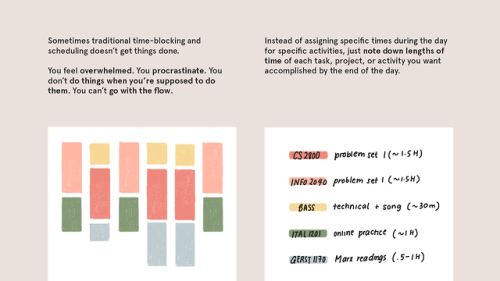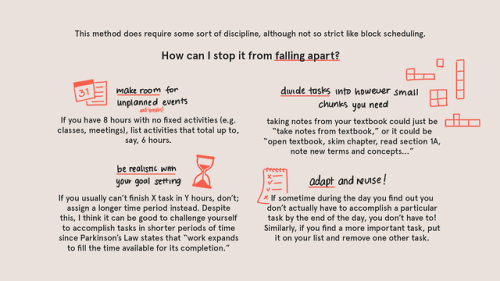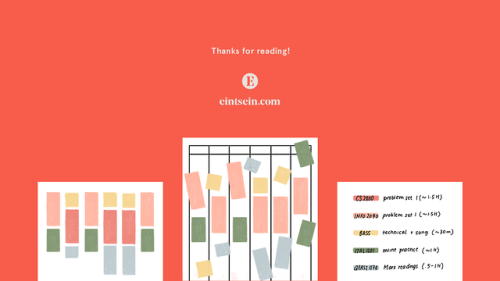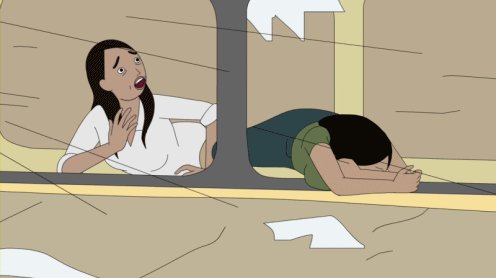Flexible Time Blocking: A More Breathable Way To Get Things Done






Flexible Time Blocking: A More Breathable Way to Get Things Done
I’ve met a lot of people who struggle with sticking to a schedule - myself included - so here’s one way you can get things done without restricting your spontaneity.
Linked: The ABCDE Method: Accomplish Tasks More Efficiently
Hope this helps!
More Posts from Queen-strawberry and Others

I’m going to uni this autumn, and I feel like most of studyblr’s incoming freshmen are just as clueless as I am. Here’s a bunch of tips from the more experienced among us, and I hope it’s just as useful to you as it is to me!
this took forever to make so i’m really hoping it’s good
Money Matters
Textbooks
Sites where you can get free textbooks by @thearialligraphyproject
Get textbooks online
Tips for textbooks by @theorganizedcoyote
Websites to get cheap textbooks by @theorganisedstudent
Ultimate guide to buying college textbooks
Safe ways to get free textbooks
Saving Money
A girl called jack: eating under the line
Qriket
Scholarship masterpost by @wallcalendar
Save money while shopping online
College scholarships 2016-17 by @wonderstudying
Tips for finding & getting scholarships
How to budget
Where to find student discounts by @collegerefs
Searching for scholarships by @collegesmarts
Creative ways to save money in college
Places that offer discounts with student id
Ways to save/earn money
Paying for college by @collegerefs
Student Life
Dorm & Living
PSA for college freshmen
Dorm tips from @humanitaes
Ultimate school locker (uni bag) kit by @girl-studying
Resolving issues with roommates
Tips for living like an adult
How to eat healthy in dining halls
DIY dorm decor by @notquitenightingale
Everything I actually used in my freshman dorm room
Guide to living alone by @piratestudy
Living with a roommate by @collegerefs
Packing Lists
Thing I forgot to bring to college by @myberkeleyadventure
Sam’s ultimate failproof guide to packing by @staticsandstationery
Ultimate college packing list for freshmen
College packing list by @kimberlystudies
What to bring to college
Checklist for dorms & campus living
Packing up: preparing for college in @theacademiczine
College dorm packing list by @produitivity
Recipes
One-pot chicken fajita pasta
100 dirt cheap recipes for students
57 go-to recipes for college students
Cheap & healthy recipes
Over 400 fast & healthy recipes
Classes
Studying & Taking Notes
Organizing notes with Google Docs by @academla
How to write a lecture summary efficiently by @collegerefs
Symbols & abbreviations for note-taking
How to take lecture notes by @hstrystdyblr
How to take notes in college by @determinationandcaffeine
Getting the most out of lecture by @strive-for-da-best
How to get your best grades in college by @saralearnswell
If you have a bad college professor
Essays
Transition words for essays by @soniastudyblr
How to analyze historical sources by @rewritign
How to write a university level essay by @healthyeyes
Analyzing a written text
Essay writing: university vs. high school
How to write a history paper by @thehistorygrad
How I plan and write literature papers by @notaperfectstudent
Exams
A quick guide to finals by @emmastudies
10 revision tips for final & first year exams
High school exams vs. college exams
Crucial study tips for finals week in college
3 day study plan by @getstudyblr
Low stress college study strategy by @plannerdy
+ More
Masterposts
A college student’s masterpost by @eruditekid
Random college tips by @determinationandcaffeine
College advice by @studenting
Giant college masterpost by @heyiwantyoutostay
Advice
Advice for college by @collegerefs
10 tips for starting uni by @studycubs
Advice from a college senior
Great tips from @fuckstudy
10 more excellent tips
Things nobody tells you about university by @polcry
Miscellaneous
8 things successful students do by @frankfurter-studies
Email tips by @haileymostudies
@collegerefs‘ entire blog– so much good stuff that’s incredibly useful
my grace.uni tag– all the posts I’ve saved for university
Staying in contact with high school friends
How to make friends in college

Reblog if you actually give a shit about anyone who's suicidal or depressed.
time blocking method






Hi all, this is werelivingarts, a new post about time management method: TIME BLOCKING! Time blocking allows you to divide your day into big blocks and helps you to complete similar tasks in one-go without any interruptions!
You can do your time blocking on:
Google Calendar (simple and easy to use)
Plan (drag your to-do list and organize them in blocks)
TickTick Premium (offer pomodoro timer)
Hope you find this helpful! ⭐️

They say that a clear space makes for a clear mind. This post will provide you with organization advice for your pencil case, backpack, desk, papers, and computer to help you function at your best!
PENCIL CASE
Don’t go overboard with the stationery. From personal experience, these are the absolute essentials you need to bring in your pencil case/pouch on a daily basis:
2 black or blue pens
2 pencils
lead refills (for mechanical pencils)
sharpener (for wooden pencils)
try to get a sharpener with a locking top so the shavings won’t spill out!
eraser
2 highlighters or colored pens
calculator (if your class requires one)
And these are some non-essential but useful items:
black Sharpie
correction tape
colored pencils (useful for drawing diagrams)
mini stapler
6-inch ruler
sticky notes and page flags
if your writing utensils are expensive and you don’t want them getting stolen, maybe bring an extra cheap pencil you feel comfortable lending out
Group writing utensils together with rubber bands. Save yourself the hassle of rummaging through your entire pouch to find one particular pen. Make groups of all your similar writing utensils (ex: pencils, gel pens, felt-tip pens, highlighters, colored pencils), then tie each group together with a rubber band for easy access.
BACKPACK
Get an actual backpack. If you’re carrying more than one or two books, please please please get a normal, two-strapped backpack (and make sure to wear both straps!). Tote bags, purses, and messenger bags are terrible for your shoulders and spine.
Place the heaviest items closest to your back. Textbooks and binders should go in the largest pocket, while your cell phone, novel, pencil case, etc. should go in the front. This helps distribute the weight better and prevent back strain.
Alternate the directions of your binders to fit more. Don’t put all of your binders facing the same direction like this. Instead, alternate the direction like this– put the first binder in with the rings on the left, then flip the second binder so the rings are on the right, and so on. This also works for spiral notebooks to prevent the spirals from getting caught with one another!
I recommend keeping the following things in your bag:
pencil case
obviously, books, notes, homework, binders, and anything else required for class
planner
phone + earbuds
house keys
water bottle
granola bar and/or dollar bills to buy snacks from the vending machine
hair ties
lip balm
gum or breath mints
tissues
feminine hygiene products
travel-sized hand sanitizer/wipes
DESK
Make “to-do” and “done” piles. Each evening when I get home, I take out all the work I have to get done and put it in a “to-do” pile. This pile is usually a mixture of textbooks I have to take notes from, worksheets I have to complete, flashcards I have to review, and books I have to annotate. As I complete my work over the course of the night, I move the finished items from the “to-do” pile into a separate “done” pile. At the end of the night, I take everything out of the “done” pile and pack it into my backpack to turn in the next day. This is by no means necessary to stay organized, but I’ve found that keeping a physical representation of both what needs to be done and how much I’ve accomplished is extremely motivating.
Take advantage of vertical space. If your desktop space is limited, make use of magazine holders, caddies, and stacking letter trays to hold more papers while taking up minimal surface area.
Use cable ties and labels to manage your electrical cords. Winding up excess cord, tying it with a cable tie, and labeling it with tape will keep your desk neat, keep your mischievous pets safe, and prevent you from tripping.
Book stands are your friends. Book stands can prop up your giant textbooks and save you desktop space. They also make reading for long periods of time more comfortable, since you can look straight ahead instead of down.
Keep a trash can and recycling bin within easy reach. This is a great way to prevent paper clutter. You won’t be tempted to leave junk papers lying around if there’s a bin right next to you.
Do a seasonal deep-cleaning. Every few months or so, take everything off of your desk and do a complete overhaul. Dust off the eraser shavings from the corners. Wipe down the surface with an antibacterial wipe. Go through all of your stuff before putting it back– if you find papers you don’t need anymore or pens that have dried up, don’t put them back.
PAPERS
I personally use a 1-inch binder for every subject. I like binders because they’re durable, easily dividable/rearrangeable, and they keep papers from falling out. Separating each subject makes it super easy to grab the work I need for just one class– for example, if I want to study math at the library, I can take that one binder and go, as opposed to lugging the papers for three other subjects along with me.
Within each binder, I keep 5 dividers. The labels on the dividers vary for each class but generally they include notes, handouts, graded work, and reference materials.
If you’re looking for lighter binder alternatives: consider 2-pocket folders, accordion folders, or binder/notebook hybrids.
Keep your papers in good shape. If you’re using binders, consider splurging on either reinforced loose-leaf paper or adhesive reinforcements so you don’t end up with a bunch of papers dangling halfway out of your binder. If you have a tendency to accidentally tear your papers or spill coffee on them, you may want to scan everything into your computer as soon as you get it so you can always print out a second copy if the first one gets destroyed.
Keep a “general” folder. Get a pocket folder and fill it with extra lined, graph, and blank paper. You can also keep other general things like your schedule, a map of your school, your report card, and/or school announcements in here. Take this folder with you to every class.
Organize weekly. No matter how well-oiled your system is, you’re inevitably going to end up shoving some papers into a random pocket. Once a week, take some time to rearrange things, put papers back where they belong, and hole-punch anything your teacher didn’t.
Transfer regularly. After we finish the first unit, I always ask my teacher if I can take out my old papers and keep them at home. The vast majority of the time, the answer is yes. I transfer all my papers from completed units from my 1-inch binder to large 3-inch binders that I keep on my bookshelf. I label each topic within them with page flags for quick reference. This way I have all the resources to study for midterms/finals, but I don’t have to carry them to school every day.
Purge yearly. At the end of the school year, I recycle all of my papers. The exception is papers for subjects I’m continuing with the next year. For example, if I’m taking US History II next year, I’ll save my US History I papers because there’s a good chance I’ll need to refer to them later. If you’re not sure whether you’ll take a subject again, I’d recommend keeping the papers in the big binder just in case.
COMPUTER
Create a folder for each class. All of your files for one class should go into the same folder. If you have a big project that involves several files, you can make a project folder within a class. At the end of the school year, you may want to combine all of your class folders into a giant grade-level folder so your old files don’t clutter up your desktop.
Save your files properly. When you’re in a rush, it’s tempting to save your essay as “asdjksdfj” to the desktop, but your future self will thank you if you take ten extra seconds to give it a sensible name and save it into a class folder.
Use separate desktops for separate contexts. I have three different desktops on my laptop: school (for academic work), extracurriculars (for managing this blog and the other clubs/activities I’m involved in), and fun (for Netflix and online shopping). Keeping these three aspects of my life on separate desktops allows me to draw the line between work and play. I won’t get distracted by having Tumblr open next to my history project, and I can focus better on the task at hand when I “switch off” from one desktop and go to another. Learn how to set up separate desktops on your computer here: {Windows//Mac}.
Tag your documents. Create a tagging system to make your files easier to search for. Your tags can be by type (“essay”, “notes”) or section (“chapter 1″, “unit 8″).
Backup your devices weekly. Accidents happen, so always be prepared. Make sure to backup your computer, phone, tablet, etc. to cloud storage or an external hard drive every week. Or at the very least, get Google Photos, which will automatically backup your photos from your phone.
Thanks for reading! If you have questions, feedback, or post requests, feel free to drop me an ask.
+Click here for the rest of my original reference posts!
—Sophia :)




The Fresh Prince of Bel-Air 2x09 - “Cased Up” (November 11, 1991)
What a kid is taught, is what a kid becomes
Mr. Turner (via girlmeetsworldfanblog)
What a legend





Artist Hank Schmidt travels to scenic locations only to paint the pattern on his own shirt.
I often think that the night is more vibrant and richly coloured than the day
Van Gogh (via lesamisarty)
-
 naistudylab reblogged this · 1 month ago
naistudylab reblogged this · 1 month ago -
 nefarious-virgo reblogged this · 1 month ago
nefarious-virgo reblogged this · 1 month ago -
 aknux liked this · 3 months ago
aknux liked this · 3 months ago -
 ladyofmisfortune liked this · 4 months ago
ladyofmisfortune liked this · 4 months ago -
 martiestudies liked this · 9 months ago
martiestudies liked this · 9 months ago -
 justforfollowingpeople liked this · 10 months ago
justforfollowingpeople liked this · 10 months ago -
 kiki-miserychic reblogged this · 10 months ago
kiki-miserychic reblogged this · 10 months ago -
 feebeeks liked this · 11 months ago
feebeeks liked this · 11 months ago -
 changinandhow liked this · 1 year ago
changinandhow liked this · 1 year ago -
 ltotheinda reblogged this · 1 year ago
ltotheinda reblogged this · 1 year ago -
 wabi-sabi-bby liked this · 1 year ago
wabi-sabi-bby liked this · 1 year ago -
 hastvings reblogged this · 1 year ago
hastvings reblogged this · 1 year ago -
 hastvings liked this · 1 year ago
hastvings liked this · 1 year ago -
 sakurafarron liked this · 1 year ago
sakurafarron liked this · 1 year ago -
 menchiesyogurt liked this · 1 year ago
menchiesyogurt liked this · 1 year ago -
 machiruko liked this · 1 year ago
machiruko liked this · 1 year ago -
 loverfromanothercover liked this · 1 year ago
loverfromanothercover liked this · 1 year ago -
 rissamarabbalt liked this · 1 year ago
rissamarabbalt liked this · 1 year ago -
 99bugs liked this · 1 year ago
99bugs liked this · 1 year ago -
 payetasoiree liked this · 1 year ago
payetasoiree liked this · 1 year ago -
 moonstone-study liked this · 1 year ago
moonstone-study liked this · 1 year ago -
 cryptid-mosses liked this · 1 year ago
cryptid-mosses liked this · 1 year ago -
 zentrodada liked this · 1 year ago
zentrodada liked this · 1 year ago -
 chaoticwholesome reblogged this · 1 year ago
chaoticwholesome reblogged this · 1 year ago -
 cancan-jpg liked this · 1 year ago
cancan-jpg liked this · 1 year ago -
 bildcontopsba liked this · 1 year ago
bildcontopsba liked this · 1 year ago -
 chillsash liked this · 1 year ago
chillsash liked this · 1 year ago -
 languagesandstuff reblogged this · 1 year ago
languagesandstuff reblogged this · 1 year ago

